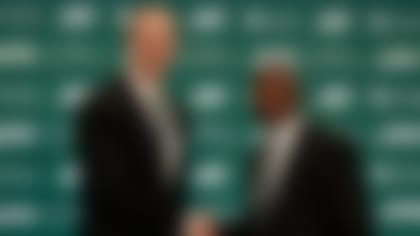The oldest -- and perhaps truest -- cliché in football is that you build your team around your quarterback. But at what point do you decide you made a mistake and start over? It's a question that the leaders of every NFL franchise must ponder sooner or later. And if they don't make the right decision, they'll find themselves pondering it repeatedly.
Eleven months ago, the Tampa Bay Buccaneers were wowing people with their imposing physical attack, sparked by rookie running back Doug Martin and led by composed, seemingly mature-beyond-his-years quarterback Josh Freeman, who had orchestrated a four-game winning streak to put the team in the middle of the playoff hunt.
At the same time down in Houston, the Texans were in the midst of an 11-1 start, eyeing their second consecutive AFC South title. Behind quarterback Matt Schaub, they had a diversified attack and a strong roster from 1 to 53; they were seriously talking about a Super Bowl run.
What a difference (less than) a year can make.
Today, Tampa Bay is 0-6, Houston is 2-5, Freeman no longer is a Buc and Schaub might be out of a starting job.
So what made it all go so wrong so fast for Freeman and Schaub? Or, put another way, how do good quarterbacks go bad? Both cases are unique -- and puzzling.
You can call Freeman's 2010 season (25 TDs, six INTs) an aberration, but even in 2011 and for much of 2012, he showed flashes of being a terrific leader, a quarterback who was going to set a good example for the rest of the team. There are rumors that Freeman and second-year coach Greg Schiano just never saw eye-to-eye, but it seems like there has to be more to the story than what has been reported. Freeman was benched relatively quickly this season -- though he had been dreadful early on -- and then didn't respond well to the demotion. After attempts to trade Freeman fell flat, the Bucs just decided to cut bait and move on, feeling that the quarterback had become a cancer to the team.
Freeman was snatched up by the Minnesota Vikings, who started him Monday against the New York Giants. Though he threw some good passes in his Vikes debut, in sum, Freeman looked like the same deliberate quarterback we saw at the beginning of this season with the Bucs -- making way too many bad throws, locking in on receivers and generally playing like a mediocre pro signal-caller, which perhaps is what he has become. And to make matters worse, Freeman suffered a concussion and appears likely to miss Sunday night's game against the Green Bay Packers.
Tampa Bay has settled its quarterback conundrum for the time being, electing to groom rookie Mike Glennon, while Minnesota has the rest of the season to decide if Freeman can become a franchise quarterback again.
Meanwhile, Schaub injured his ankle in a Week 6 debacle against the St. Louis Rams and was inactive for last week's loss to the Kansas City Chiefs (Houston's fifth consecutive defeat). While coach Gary Kubiak reiterated Monday that Schaub is the team's starting quarterback, he did admit that the Texans will continue to evaluate the position during their bye week. Given Schaub's lackluster play prior to the injury and the poise/touch Case Keenum displayed against a formidable K.C. defense, this situation surely remains extremely fluid.
Brooks: Rise of an NFC dark horse?
While Schaub's unfathomable streak of four straight games with a pick-six has generated most of the headlines, he's taken a step back in other areas, too. His yards-per-attempt average ranged from 7.6 to 8.5 during his first five years in Houston, but it declined to 7.4 in 2012 and sits at a lowly 6.7 this season. He threw 90 touchdown passes to 45 interceptions from 2009 to '12, but he owns an 8-to-9 TD-to-INT ratio this year (made worse by the four defensive touchdowns that immediately ensued).
So while Tampa Bay is forging ahead with Glennon, Minnesota and Houston must decide what to do with Freeman and Schaub, respectively.
What makes these decisions additionally fascinating is that they come on the eve of the deepest quarterback draft in years, at a time when the league is going to see the QB market suddenly flooded. With a number of first-round talents expected to be available in the 2014 NFL Draft, plus Sam Bradford, Cam Newton and Jay Cutler all likely to be seeking new contracts, it's going to be -- for the first time in a long time -- a buyer's market for quarterback talent.
The game evolves, and what seems a solid foundation one year can become shaky the next. As observers, we also have to update our yardsticks. In 2002, four players threw for 4,000 yards. Last year, there were 11. By definition, in the zero-sum world of the 32-team NFL, just 16 teams can have above-average signal-callers. But everyone seeks the elusive "franchise quarterback."
In any discussion about franchise quarterbacks, it's instructive to look at the 12 QBs drafted No. 1 overall since 1998. Judging that group today, the two obvious elite choices were Peyton Manning and Andrew Luck. Maybe you include Eli Manning in that tier, maybe you put him at the top of the next echelon -- a group of solid No. 1 picks that would include Matthew Stafford, Carson Palmer, Alex Smith and Michael Vick. (The latter four don't have Eli's rings, but they've all proven to be steady pros capable of leading their respective teams to the playoffs.) The obvious busts are JaMarcus Russell, David Carr and Tim Couch.
That leaves two No. 1 picks about whom the jury still is deliberating: Bradford and Newton.
Bradford has plenty of excuses, having worked with three different offensive coordinators/systems in four seasons, as well as an extremely limited supporting cast. In some ways, he looks like he could evolve into an Alex Smith-type quarterback -- one who doesn't turn over the ball much, having averaged one pick every 46 pass attempts. But he also doesn't throw many scoring strikes, averaging one TD pass every 30 attempts. (You'd like your QB to be closer to the 1-in-20 range.) Bradford was on pace for a strong 2013 season -- projected to have a 32-to-9 TD-to-INT ratio -- but now he must start over fresh in 2014 after rehabbing from his season-ending knee injury.
Newton has put up good -- at times, even terrific -- numbers, and he's on pace to finish with 27 touchdown passes to 13 interceptions in 2013. But like Bradford, Newton hasn't been able to lift his team above the level of mediocrity. The Panthers are sitting at 3-3 this year and look poised to make a playoff run -- IF Newton can continue his improved play.
College QB tracker
Fresno State has emerged as a potential BCS buster, and Derek Carr is a big reason why. Carr takes his place among the elite in Bucky Brooks' latest ratings. **More ...**
Will Bradford and Newton eventually find themselves in the same place as Freeman and Schaub? I think Bradford deserves (and likely will get) another chance -- though he needs more weapon to succeed. At the same time, the Rams -- with two first-round picks in a quarterback-heavy draft -- might be tempted to start over. Meanwhile, Newton has a lot riding on the second half of this season; if he can guide the Panthers into the postseason, he'll put great pressure on Carolina to sign him to an extension before the final year of his current deal.
As for the two quarterbacks who have fallen the farthest in the past year? Freeman needs to show something, or he's going to be left with only cut-rate deals heading into 2014. At 32, Schaub probably already signed his last big contract.
Tampa Bay and Houston built their teams around Freeman and Schaub, respectively, and right now, those teams are coming apart. This further accentuates why quarterback is the most difficult -- and most crucial -- position for an NFL franchise to fortify.
Follow Brian Billick on Twitter @coachbillick.




